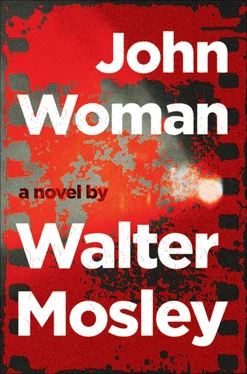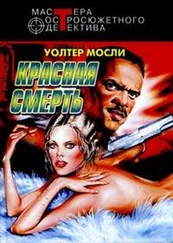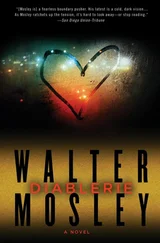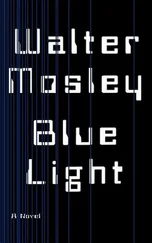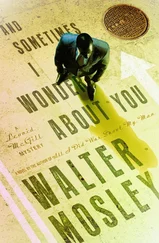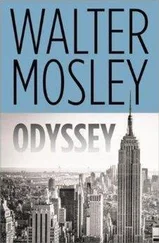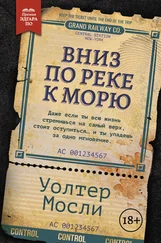“Take my books if you want them. Burn them if they offend you. Go to school or work on an oil rig. I do not care. Not because of a lack of love but because my love for you could never be greater. I confer upon you the greatest gift: freedom from the chains of your blood.”
Cornelius was moved by his father’s amnesty. He felt that Herman knew about Chapman Lorraine and offered absolution.
Freeing the fledgling from the confines of the nest, John Woman reflected years later. But still the chick wondered if he could fly.
The next morning Herman was crying in his bed.
“I hurt.”
“Where, dad?”
“Everywhere.”
Cornelius sat with him until Violet came. He wrote her a check for three hundred dollars asking her to spend a little time each day with Herman.
“You don’t have to clean,” Cornelius said, “just sit with him and give him water if he gets thirsty.”
The doctor who came the next morning was Violet’s niece’s husband. He was a short, dark-haired Frenchman come to America to live with relatives while he studied heart medicine in Chicago. There he met Stella Breen, a mother’s girl who always meant to come home.
“He’s very sick,” Dr. Artaud said. “But I see no reason to put him in the hospital. They’d only send him off to a nursing home. Keep him comfortable and give him the medicine I prescribe. He won’t live very long.”
The doctor was sad to see the effect his words had on Cornelius. At that time the boy still believed in the authority of professionals. He thought that there was some injection that might get his father sitting up and talking about the newly released book of slave narratives.
“What’s wrong with him?” CC asked.
“It’s his heart.”
“But why didn’t they say that at the hospital?”
“Sometimes,” Dr. Artaud said, “American doctors ignore the signs of the poor.”
Violet slumped into the stuffed chair and cried at the pronouncement.
They had sixteen thousand dollars in the bank and a few savings bonds in a safe-deposit box that his father kept. The first batch of drugs cost eight hundred and forty-seven dollars. Cornelius handed over the money without hesitation. He gave Violet a thousand dollars to keep coming over the next month, especially to be there in the evenings when he had to go to work.
That was Tuesday.
On Wednesday Herman rallied. He sat up and talked with his son about the history of thought.
“Thought and language are like breathing in and breathing out. They are inseparable and at the same time opposites. Together the two make up the mental image of possibilities in the material world. The closer they come to bringing this reality in line with our experience the more true our expressions of mind.”
“So,” Cornelius asked, “the advance of the history of thought is more like a science because it gets better all the time?”
“No,” Herman said sadly. “Our use of thought and language has deteriorated over millennia. The Greeks saw the world more clearly than do we. The Aborigines of Australia saw themselves as part of a magnificent deified universe of which they were but a small part, while western man sees only a toy-box that was set there for him by some shadow being that has already forgotten humanity.”
Every truth the old man sought ended in unconsciousness or death.
The next day Herman called for Cornelius and asked him to please turn on the lights. When Cornelius told him that the lights were already on he said, “Then the darkness is in my eyes.”
The next day he began to shout about men crossing the river.
“There’s no one there, dad,” Cornelius said to him.
“I see them coming. I see them.”
His blind eyes were wide with fear, his fingers jabbing the air.
“Over there! Over there!”
By Saturday the autodidact from the Mississippi Delta could only murmur his fears.
“Oh no,” he’d cry from time to time, his arms moving about weakly, his flailing hands slowing now and then to fold tissues into tiny squares.
On Sunday Cornelius awoke to the sound of his father’s labored breath. He came into the room to see Herman lying on his back, gasping for air. His eyes were wide, his mouth gaping.
Cornelius took the elegant hand and it gripped him like a vise.
With all of his being Cornelius concentrated on his father. The already slender Herman had lost twenty pounds. Cornelius could see the skull under the papery flesh of his father’s face. He smelled of dead skin.
Father and son held on to each other until suddenly Herman hiccupped and stopped breathing. It took a few moments for Cornelius to realize what had happened. The room was absolutely silent. There was no salsa music playing, no rumble in the ground.
The young man held his dead father’s hand and counted his own heartbeats, each pulse taking him that much farther away from his sire.
He couldn’t cry, wasn’t really sad. It was just that he could not imagine a world without Herman Jones.
Violet came into the room at four that afternoon.
“Oh my God he’s dead,” she said from the doorway.
Cornelius looked up at her and said, “Leave us alone please, Miss Breen. I’ll make the calls later.”
Over the next three days he didn’t answer the phone or knocking at the door. He didn’t eat or cry. He spent most of his time at his father’s side, holding the stiff dead hand.
When the police entered the room, after getting the landlord to let them in, they found Cornelius reading aloud from Herodotus.
“What do you want?” he asked the officers.
“You have to come with us, Mr. Jones,” one of them said.
He remembered thinking that this was the first time anyone had called him mister.
He was kept in a holding cell in the precinct where they brought him. Colette came to visit twice a day.
“They have to investigate the death because your father wasn’t that old and because you kept the body so long,” she’d said. “They’re supposed to put you in juvenile detention but I asked for protective custody — this is much better.”
“I see,” Cornelius said. “Thank you.”
“Can I do anything for you?”
“I’d like some books.”
“What kind of books?”
“History.”
On the day of his release Colette was there.
“What did they say?” Cornelius asked.
“Your father had serious heart disease. That’s what killed him. Was he being treated for something like that?”
“Only by Violet’s nephew-in-law. But by then it was too late,” he said. “Maybe if somebody in the hospital had told us we could have taken him to a heart specialist. We could have given him heart medicine. But I guess it wasn’t meant to be. I guess he was always going to die like that.”
“I told them that you were gainfully employed and that you supported the household so they’re letting you go back home,” Colette said.
She drove him in her Honda. When they parked in front of his building she touched his shoulder.
“Harry and I are getting married in the spring,” she said. “I’m pregnant with his child.”
Again Cornelius’s eyes played that trick on him. Colette seemed very far away. He felt that to talk to her he would have to shout and so he didn’t say anything. He just nodded and opened the door.
“I still want to see you, CC,” she said.
He nodded again, climbed out, then walked into the building without looking back.
He spent six thousand of the remaining fourteen thousand dollars on the funeral, which was held at the Baxter Chapel on Flatbush Avenue. The police released the body to Baxter’s and Cornelius didn’t want to move his father around any more than necessary.
Читать дальше
